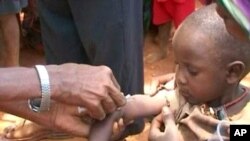Ann Veneman, Executive Director of UNICEF, said, "The numbers of children vaccinated today are at an all time high. We have numbers to prove this."
She says global efforts have stopped a downward trend in vaccinations and have even boosted the number of children and infants being vaccinated.
The results are nothing short of phenomenal.
"Worldwide there have been nearly three quarters drop in deaths due to measles since 2000," she added.
Now the Americas are measles-free.
"The disease that is measles has been eliminated in the region of the Americas and that is great news," she noted.
The information is in a report called "State of the World's Vaccines and Immunization," issued by UN agencies and the World Bank.
It says that for the first time, the number of children dying every year has fallen below 10 million and immunization saves 2.5 million children every year.
UNICEF's Mickey Chopra says the report is a call to increase funding for immunizations.
"Focusing on immunization coverage often can be a way of focusing on those who are excluded from society, excluded from health services, more than just the vaccines," he said.
Most vaccines help prevent disease in children, but reaching children in remote rural areas is often a challenge especially in poorer and war-torn countries.
It can only be done, experts say, if the government in power approves and with help from non-governmental organizations.
Richard Greene is an infectious disease expert with the U.S. Agency for International Development.
"Civil Society plays a key role in helping to communicate the need for mothers to bring their children in early for vaccines - to complete the vaccination series - to make sure that non-governmental organizations deliver and offer vaccines not only one day a week necessarily but on a regular basis," he said.
Vaccines that protect against pneumonia and diarrhea are a top priority for health experts seeking more funding.
Pneumonia and diarrhea account for over one third of all deaths among children under the age of five.
More than 80 new vaccines are in late-stage clinical trials. Thirty of them target diseases for which there are no immunizations, like malaria and dengue fever.
The report says if all countries immunize 90 percent of children under five with vaccines already available, that would prevent another two million deaths a year.
News
Experts Say Childhood Vaccinations at All-Time High
update

More infants are being immunized than ever before, according to a joint report by UN agencies and the World Bank. But experts say much more needs to be done to protect the world's poorest children from needless suffering.









